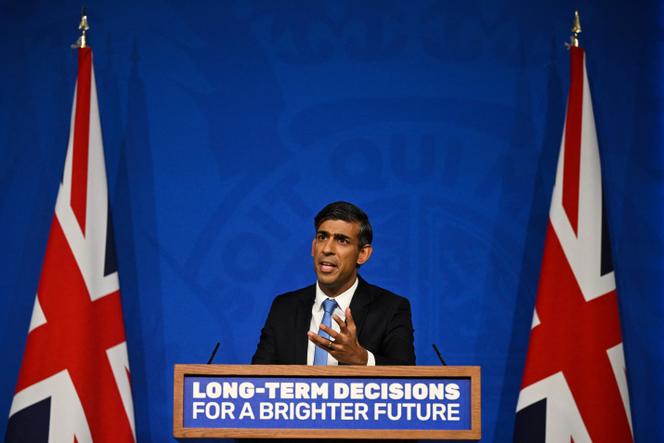


Prime Minister Rishi Sunak announced on Wednesday, September 20, that he’s delaying by five years a ban on new gas and diesel cars that had been due to take force in 2030, watering down climate goals that he said imposed "unacceptable costs" on ordinary people.
The move angered green groups, opposition politicians and large chunks of UK industry, but was welcomed by some in the governing Conservative Party who chafe at the expense of switching to renewable energy.
At a news conference, Sunak said he was moving the deadline for buying new gasoline and diesel cars from 2030 to 2035, and also delaying a ban on new natural-gas home heating that had been due in 2035. He said he would keep a promise to reduce the UK's emissions of climate-warming greenhouse gases to net zero by 2050, but "in a better, more proportionate way."
Sunak argued the UK was "far ahead of every other country in the world" in transforming to a green economy, but said moving too fast risked "losing the consent of the British people." "How can it be right that British citizens are now being told to sacrifice even more than others?" he said.
The government has previously boasted of Britain being a leader in cutting carbon emissions. UK greenhouse gas emissions have fallen by 46% from 1990 levels, mainly because of the almost complete removal of coal from electricity generation. The government had pledged to reduce emissions by 68% of 1990 levels by 2030 and to reach net zero by 2050.
But with just seven years to go until the first goalpost, the government’s climate advisers said in June that the pace of action is "worryingly slow." Sunak’s decision in July to approve new North Sea oil and gas drilling also spurred critics to question his commitment to climate goals.
Former Prime Minister Boris Johnson, who brought in the 2030 gasoline car target when he was leader, said businesses "must have certainty about our net-zero commitments." "We cannot afford to falter now or in any way lose our ambition for this country," he said.
News of plans to backtrack broke as senior politicians and diplomats from the UK and around the world – as well as heir to the British throne Prince William – gathered at the United Nations General Assembly in New York, where climate is high on the agenda. Sunak is not attending, sending his deputy instead.
Greenpeace UK policy director Doug Parr said the prime minister was "taking the public for fools." "Rowing back on home insulation and commitments to help people move away from gas will ensure we stay at the mercy of volatile fossil fuels and exploitative energy companies," Parr said.
Environmentalists were not the only ones blindsided by the move. Automakers, who have invested heavily in the switch to electric vehicles, expressed frustration at the government’s apparent change of plan. "We’re questioning what is the strategy here, because we need to shift the mobility of road transport away from fossil fuels towards sustainable transport," said Mike Hawes, chief executive of the Society of Motor Manufacturers and Traders, an industry body.
Ford UK head Lisa Brankin said the company had invested £430 million ($530 million) to build electric cars in Britain. "Our business needs three things from the UK government: ambition, commitment and consistency. A relaxation of 2030 would undermine all three," she said.
